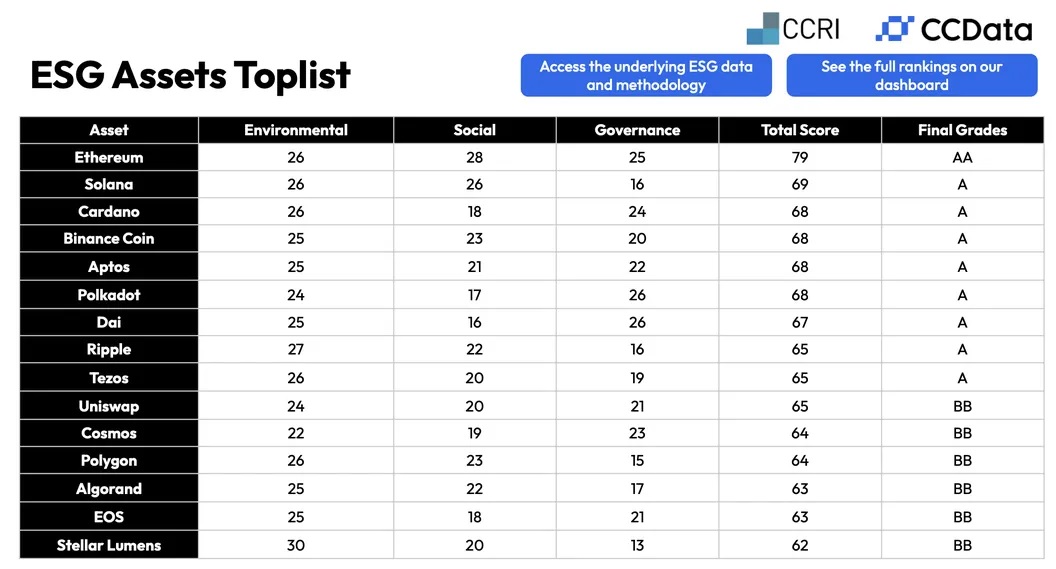 According to research conducted by crypto data firm CCData, Ethereum has emerged as the top-ranked digital asset in the first institutional-grade crypto ESG (Environmental, Social, and Governance) ranking. Solana and Cardano followed closely behind, while Bitcoin lagged due to its significant energy consumption. The findings were published in CCData’s inaugural ESG Benchmark, a collaborative effort with the Crypto Carbon Ratings Institute (CCRI). The benchmark evaluated 40 of the largest and most liquid digital assets, assessing parameters such as decentralization, security, and climate impact.
According to research conducted by crypto data firm CCData, Ethereum has emerged as the top-ranked digital asset in the first institutional-grade crypto ESG (Environmental, Social, and Governance) ranking. Solana and Cardano followed closely behind, while Bitcoin lagged due to its significant energy consumption. The findings were published in CCData’s inaugural ESG Benchmark, a collaborative effort with the Crypto Carbon Ratings Institute (CCRI). The benchmark evaluated 40 of the largest and most liquid digital assets, assessing parameters such as decentralization, security, and climate impact.
The role of ESG mandates in investments is gaining prominence, particularly among institutional investors and large asset management firms. A report by global accounting firm PricewaterhouseCoopers (PwC) last year forecasted that ESG-related assets under management could reach 33.9 trillion by 2026, representing one-fifth of all global investments. CoinDesk’s Consensus conference attendees emphasized that for crypto to attract new institutional investments, it should embrace ESG principles rather than shying away from them. Notably, asset management giant BlackRock, a key advocate for registering a spot bitcoin ETF, strongly supports ESG-focused investments.
CCData recognized the growing demand for ESG considerations in the crypto industry and developed the new scoring framework to address this need. The ESG Benchmark serves as a crucial initial step in enhancing the industry’s resilience in the face of ESG challenges and regulatory scrutiny, considering ESG requirements as a top priority, as highlighted by regulators, policymakers, and the media.
The benchmark assessed the environmental, social, and governance risks and opportunities associated with digital assets, taking into account various metrics such as decentralization, energy consumption, and community engagement. Each metric’s points were aggregated and weighted to determine an overall score, with a maximum of 100 points, resulting in the final grade ranging from AA (best) to E (worst). Assets receiving a grade of BB or higher were considered top-tier in the report.

Ethereum stood out as the only blockchain to achieve an AA grade, performing well across all three ESG factors. The report attributed this success in part to Ethereum’s recent transition to proof-of-stake technology, which significantly reduced energy consumption and rendered miners obsolete. Solana, Cardano, and Polkadot excelled in decentralization, earning them an A grade in the top-tier category.
Bitcoin, on the other hand, received a B grade, garnering high scores in social and governance aspects but facing criticism for its substantial energy consumption and hardware requirements. The report emphasized the need for Bitcoin to address these concerns to improve its ESG standing.
The CCData ESG Benchmark represents an important development in the crypto industry’s efforts to address ESG challenges, fulfill regulatory expectations, and cater to the growing interest from institutional investors. As the industry continues to evolve, embracing ESG principles will likely play a crucial role in attracting and retaining institutional capital.








